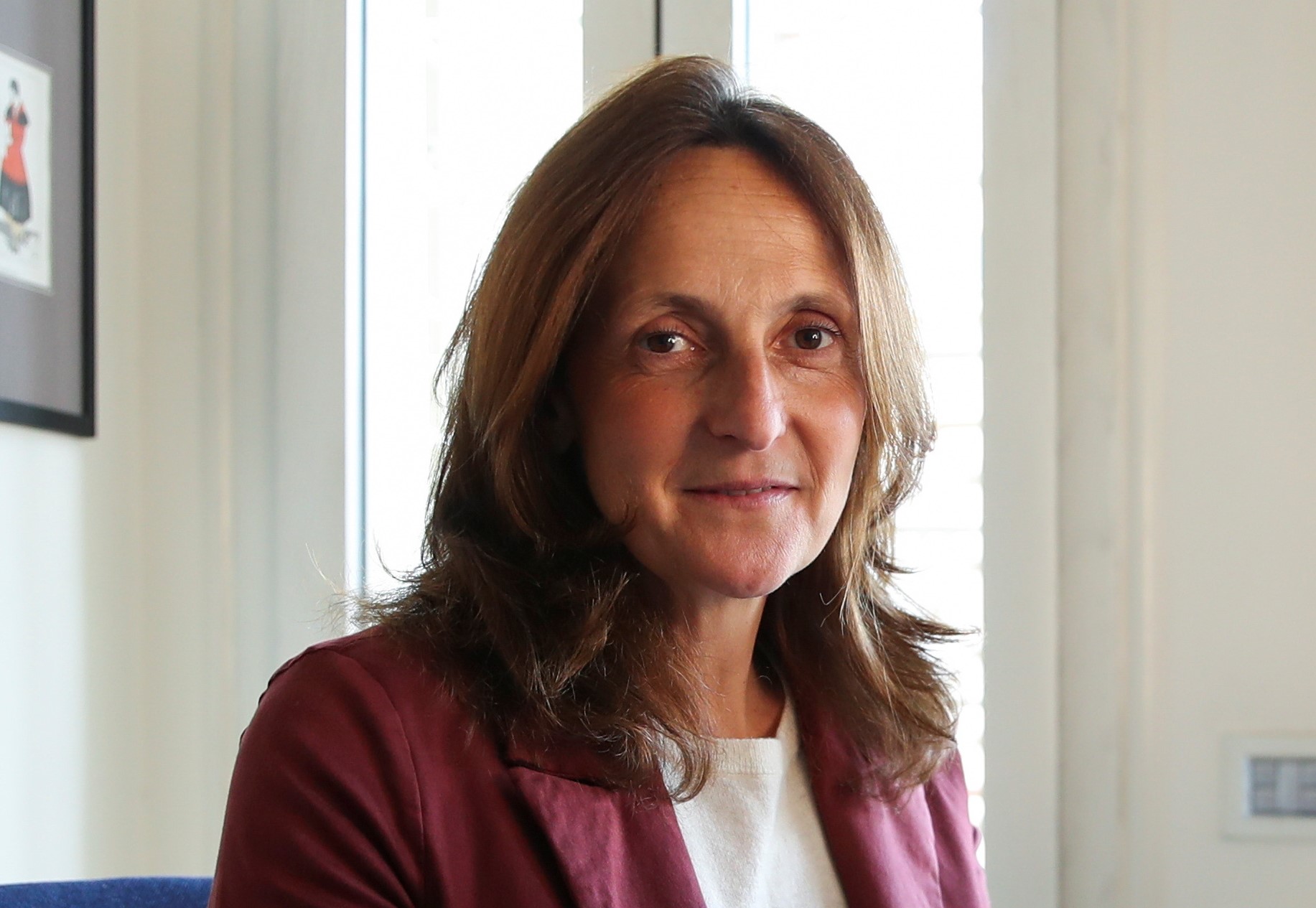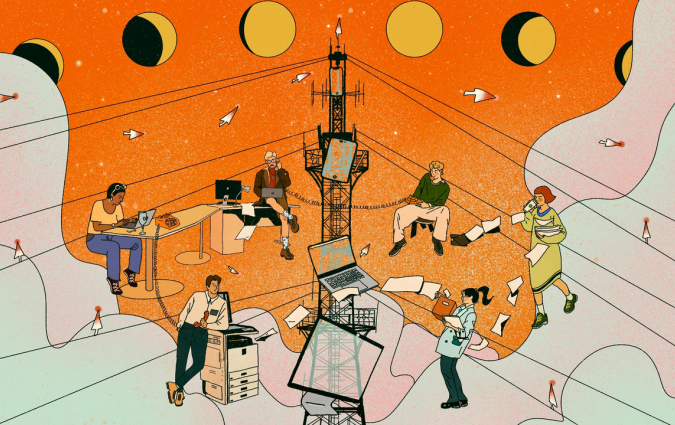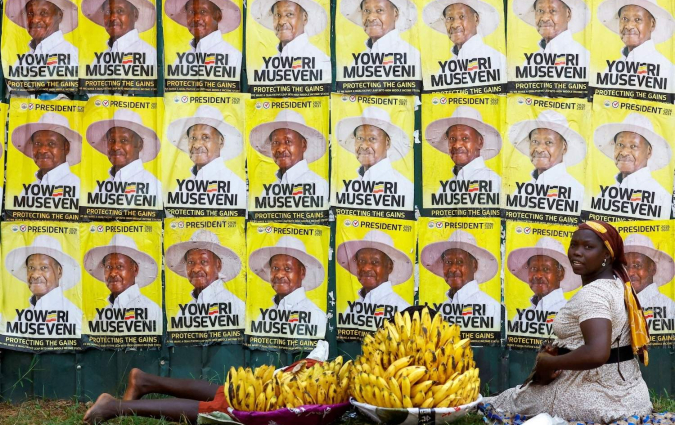“In a world of cultural warriors, playing it down the middle is a journalistic imperative but also a huge commercial opportunity”

Alessandra Galloni. | REUTERS
Alessandra Galloni (1974) is the first woman to lead Reuters. Born in Rome, she graduated from Harvard and the London School of Economics, and started to work for Reuters in Rome in 1996 after a brief stint at AP. She left the news agency for the Wall Street Journal before returning in 2013, first as editor of the Southern Europe bureau, then as global managing editor. In April 2021 she succeeded Stephen Adler as editor-in-chief.
A respected business journalist, Galloni has worked as a reporter and editor in London, Paris and Rome. She has wanted to be a journalist since she can remember. “I worked for my middle-school newspaper, my high-school newspaper and my college newspaper. I've really been doing this for more than 35 years. I've never wanted to do anything else,” she says.
On Monday 7 March, Galloni will deliver the Reuters Memorial Lecture, the most important event we host every year at Reuters Institute. As her reporters relentlessly documented the war in Ukraine, she spared 45 minutes for a wide-ranging conversation in a hectic week. We discussed her vision for Reuters, her views on impartiality, and her thinking on how a news agency should adapt to the digital age. conversation has been lightly edited for brevity and clarity.
Q. How would you describe your career?
A. I've worked [mostly] for two news organisations: Reuters and the Wall Street Journal. And I really feel that news agencies are the real bedrock of shoe-leather fact-based reporting. It’s the source of news all over the world.
What is interesting is that mainstream media have merged to a certain extent. When I started at Reuters, there was a difference between news agency journalism and newspaper journalism because you didn't have the vast expanse of the internet that provided you with endless capacity. Today newspapers, even magazines, have started real time operations, and are becoming aggressive on real time news. At the same time, news agencies like ours have ventured into curation. We have our own websites. We do long-form and investigative journalism.
Across my career I've mostly covered business, economic and financial news. I'm a firm believer that the prism of economics is a good way to tell larger stories but I've gone beyond that. I started on the Italian-language service in Rome and that has shaped the way that I think about the importance of having deep local expertise, and coupling that with a great global reality. That combination is really important.
Q. What’s changed at Reuters since you started back in 1996?
A. The ability to be fast has changed. Journalists are not the only vehicle through which institutions and individuals propagate news. It’s a process we’ve seen in the last 25 years. Politicians, central banks and treasuries go directly to the population and try to circumvent the journalists in the middle. We know why they do that. They don't want their message filtered. On the other hand, the role of good journalism is to filter what is important and to provide context because without context data and facts can be used to say anything.
The ability to be fast and first has also changed on the ground. If you look at the geopolitical events we cover, there was a time, not even so long ago, when a Reuters reporter would be the only actor on the ground and often that news would hold as a result. That’s changed with citizen journalism.
Q. How?
A. Citizen journalism has democratised information. It has been a great thing for the understanding of global events like the Arab Spring. But this also raises the whole issue of verification. Just a simple deluge of information makes it harder for the audience to understand what is true and what is false. So the ability to be first to tell what's happening on the ground has become much harder. But being first – and more importantly being right – is something we always aspire to.
Another thing that’s also changed is the sensibility of understanding the world that you cover. This didn't exist 30 years ago. I’m talking about the importance of having a newsroom that is a reflection of the world outside. That means local understanding but also a sensibility in terms of diversity of ethnicity, diversity of gender, diversity of sexual orientation. In short, having a newsroom that is sensitive and understands because of its own makeup.
This is a real priority for our newsroom.
Q. The conditions in which journalists work have also changed.
A. Yes. Over the last decade, we’ve seen crackdowns on independent journalists. Of course, it has happened before. Our own trust principles were drawn up in 1941, when there were similar attempts to spread propaganda. But what we've seen over the last few years, helped by the tools of social media, has really reached a very high level.
Attempts by governments, individuals, and moneyed interests to crack down on journalism have risen. Over the last decade we have devoted many resources to the safety of our journalists, in particular those who operate in countries where that crackdown is particularly acute.
Q. Let’s talk a bit about Ukraine. In the past, when a war started, witness accounts, videos and pictures were pretty scarce. Today social media is overflowing with unconfirmed visuals and propaganda from both sides. How do you think Reuters’ role has changed if you compare it to the Balkan wars in the 1990s?
A. Many things haven’t changed. In terms of news-gathering, we follow the same rules as two decades ago. In terms of safety, we have become much smarter and much better at protecting our people. But you are right. Some things have changed. Whereas before the trouble was being in the right place to get the right picture, now there are many images and the challenge is to decide what’s the one that actually tells the story.
We are increasingly using user generated content on our own coverage but only after running it through our verification process.
Ukraine is a story that's being told on TikTok, with people posting while evacuating or surveying their living rooms under rubble. That is happening in real time before our eyes. What is also happening is that there's a lot of misinformation out there or images from past conflicts. So that is why we have the tools to verify them.
But I’m so encouraged by what I see. One of the big questions that we face as global news organisations is how many people care about something on the other side of the world. With Ukraine, we know. People are interested. They want to know about the fate of people on the other side of the world. And that's without considering economic ramifications that can come from that. We don't even know the full extent.
Q. You mentioned the fact that newspapers and news agencies are increasingly doing similar things. So in the context of this war, what can Reuters provide that is actually unique, compared to the New York Times or the Wall Street Journal?
A. It goes back to something I was saying before: what I call our glocality. We have global reach: we work in 200 places and we have a global understanding. But it is the local presence that makes us unique.
Reuters has been in Ukraine for a very long time. And when the first signs of this conflict emerged, we had Ukrainian journalists on the ground who knew what was going on. That makes a difference.
It’s important for the sophistication of understanding. One of the things that’s been discussed is how you can tell a global story in a sophisticated manner, without looking at it through the lens of an American or a British point of view. Well, the way we've always done this is by combining the global view with our local presence. That’s been important in places like Myanmar and the Philippines. It's been important in Ethiopia in recent times and it's proving very important now in Ukraine.
Of course, it's a great responsibility, because reporting on your own country for the foreign press, which some countries would classify as a foreign agent, can be more dangerous. So we spend a lot of resources protecting our local journalists.
Q. The public sphere is increasingly polarised in many countries, and there's been a clamp down on fact-based reporting. Do you think journalists should do their jobs differently in this kind of environment?
A. The answer is not black and white. What needs to stay the same is the obsessive search for facts and truth, the obsessive checking of every detail even if it comes from the horse's mouth.
We are in a situation in which many journalists or many media organisations have become cultural warriors and accepted the pressure to be on one side. For some, that’s fine. For us, it’s not. As unsexy as it may seem, our DNA is to really stay in the middle, to make sure that we are telling all sides of the story.
Does that mean that we can't have a point of view? It's slightly more nuanced than that. Telling all sides does not mean giving equal attention to all sides. If you have the evidence that supports one story, you have to show the other side, but the reader or the viewer will understand where the facts are leading the story towards. Telling all sides doesn't mean that all sides get equal attention. That's a distinction that sometimes people don't think about.
Q. Yes, and our own data suggests that most news audiences actually want journalists to reflect all sides. But a sizeable percentage of younger audiences and left-leaning audiences don't agree with this.
A. Yes. But I think that COVID-19 did show us that there is a big demand for impartial, fact-based news. Why? Because when you have skin in the game, when it's a matter of survival, then true and trusted information matters.
Politics is an area where it's easier to be polarised. In the United States, even COVID-19 became polarised. Interestingly, trust levels are higher for local politics, as local politicians are dealing with things people care about like education or food or health care.
Going back to your question, what I just said is also true for younger generations because they're more informed and they're more savvy, and they understand the importance of having someone who waves through the cacophony for them.
In this world of cultural warriors, playing it down the middle is a journalistic imperative but also a huge commercial opportunity.
Q. And yet there's this debate about news organisations featuring both sides on a topic like climate change, which is indisputable from a scientific point of view.
A. Yes. And as I was saying before, telling all sides does not mean you give equal weight to all sides. A story can embrace a point of view that is based on the rigorous accretion of facts. But at the same time, it presents the counterfactual, the competing argument, and that's because it's a sincere effort to be fair and balanced. The goal is not to create a false equivalence. The goal is to be fair. That is the distinction.
Journalists are humans. Journalists have opinions. But you have to put those aside when you gather your information and examine it. That’s the way you pursue information that’s important for people's lives.
Q. Should Reuters journalists share their own opinions on social media?
A. Journalism is not something you do. It is something you are. It’s something that you can’t divorce from. If you are a Reuters reporter who has social media presence, just remember that people will see you as such. When you are out there and you have a public persona through your byline, it’s very difficult to say that you are operating in a private sphere.
What I always urge our journalists to think is that anything they say is going to reflect on their ability to report. But I do understand that social media is also a news-gathering tool and a way to amplify the impact of our stories.
Q. I would like to ask you briefly about Reuters’ next steps. A paywall was announced and then postponed. But at the same time you're launching newsletters and taking steps that bring you closer to the strategy of established newspapers like the New York Times. What’s your vision for the next few years?
A. Reuters reaches about two billion people every day in three different ways: through the financial terminal (which is our biggest client), through all our agency customers, and then through our new professional business, which includes a new website, which in this crisis has attracted more traffic than we ever imagined.
This is our direct-to-consumer play. And I think that's great. It means we can reach more people and it’s a business opportunity as well. Yes, we were originally going to launch a subscription service that has been halted for now. But the talks are still ongoing, and in any case we are developing the website and there are other ways to create revenue. So I'm confident that we will have all the sort of commercial tools available to make our website thrive.
Q. I left for the end the remarkable fact that you are the first woman to lead Reuters in 170 years. You are also Italian, and one might say an outsider to the Anglosphere. Do you think any of these traits has helped you to be a better editor?
A. One of the things I love about Reuters is that we are of no country. I started here as part of the Italian-language service. So for me to come back and become the editor-in-chief for the whole organisation is the greatest honour of my life. It is a huge responsibility too.
In terms of being the first woman, it’s something I had not given that much attention to. I did my job. I have been so lucky to have editors and mentors who have allowed me to do whatever I wanted without any limitation.
But now I'm beginning to realise the importance of it. And I often quote Sally Ride, the former US astronaut, who said “I didn't become an astronaut to be a role model.” She became an astronaut because she wanted to go into space. I became a journalist because I wanted to be a journalist. Because I believe in the impact that journalists can have. But now I realise that role models are important. And as Sally Ride also said, people can't be what they can't see. So if I can serve that role for all the women journalists out there from all nationalities of all ethnicities, then that's great.
I'm going to add one other point. Some of the best photo coverage that I'm seeing on the ground in Ukraine is of Ukrainian women. And I think that it takes a certain sensibility to cover certain aspects of the crisis that might not be right there in front of your eyes. And it has gotten me thinking about what I truly believe in: that to have that sensibility inside your newsroom, you have to work at it. It’s something that helps you gather the news better.
Alessandra Galloni will deliver the 2022 Reuters Memorial Lecture on Monday 7 March. You'll be able to watch the event in this link.







